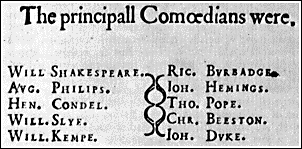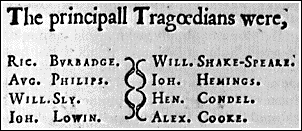Shakespeare, actor
References after Shakespeare's death suggest that he tended to act the parts of older men: Adam in As You Like It, kings in plays like Henry the Fourth, Part One, the Ghost in Hamlet, and so on. A contemporary, John Davies of Hereford, wrote an epigram, "To our English Terence, Mr. Will: Shake-speare," that reads in part:
Some, say (good Will) which I, in sport, do sing,
Had thou not played some Kingly parts in sport,
Thou hadst been a companion for a King.
(from The Scourge of Folly, 1610)
There are less equivocal pieces of evidence concerning Shakespeare's profession as actor, though they do not specify the parts he played. The prefatory material to the First Folio of Shakespeare's works, published in 1623, lists him in "The Names of the Principall Actors in all these Playes"; his colleague (and possible rival) Ben Jonson puts him at the top of the list of the "principall Comoedians" in his play Every Man in his Humour, first acted in 1598:
In his less successful tragedy, Sejanus (1603), Jonson also includes Shakespeare as a "Tragoedian."
Interestingly, recent scholarship has provided evidence from the texts of the plays themselves that Shakespeare did indeed play parts of older men: Don Foster's textual analysis of Shakespeare in his SHAXICON database has provided a list of the parts he may have played.
There is more about Shakespeare's career as actor in the section on the acting companies of Shakespeare's time.

